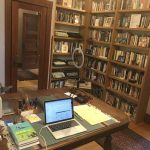The greatest “art gift” I ever received was a penmanship exercise.
Let me explain. In the fourth grade, to practice our cursive writing, my teacher assigned us the task of copying out a poem in cursive. We were sent to our small school library one-by-one and looked for a poem to copy out. I saw a book I recognized from home—a book of sonnets by William Shakespeare. I randomly picked a page and started writing. It was Sonnet 14: if you are interested in looking it up, here.
Something about the concentrated effort of practicing cursive combined with the rhythms and rhymes, word-play and vocabulary of the sonnet created an electric event—connections forming in my brain about how words could be used and put together. I got a glimpse of how a poem can activate language in a way other forms of writing don’t.
I didn’t “understand” the poem. I could understand certain words and phrases, but the poetic Elizabethan English and complex themes were beyond my 10-year-old brain. Still, I felt the poem more than comprehended it, and that was enough, I was hooked!
When I teach, I try to replicate that moment for students. Too often, in school poetry is used only as a platform of analysis or “de-coding” the poem, concentrating on meaning. That often turns people off poetry, and I see my role as pointing out that poetry need not be an intellectual exercise, but just a delight in language.
My superpower is my firm belief that every person has at least one poem in them.
This helps me in my work and Snow City Arts, and in my role as the first poet-in-residence at the Field Museum. In both places, I have a limited amount of time, so I have very little time to convince the student or museum visitor that yes, they can write a poem and yes, they want to write a poem, even if just to pass the time. My most rewarding workshops are often with students who may never write a poem again in their lives, but are delighted with the fact that they have written one and that they were made to feel that poetry was available to them, too, and not just an imagined few who “have a knack” for writing.
I am trying to replicate that strategy into our new virtual instruction efforts: to make poetry fun, interesting, and easy, and to show how you might surprise yourself with what you say, and how you say it. We all think poetically at times; it is my job and my great delight to help people discover the poem they didn’t realize they could write.





This is wonderful! You express what I feel about poetry. I am sick of intellectually analyzing poems. No wonder people run away when the word poetry is mentioned.
I have been writing poetry on and off for over 50 years. I am writing a lot now since I have time off work and quiet time.